History of the Library
“My library shall be for all, rich and poor without distinction of race or color, who, when properly accredited, can take out the books if they will handle them carefully and return them.”
— Enoch Pratt19th Century

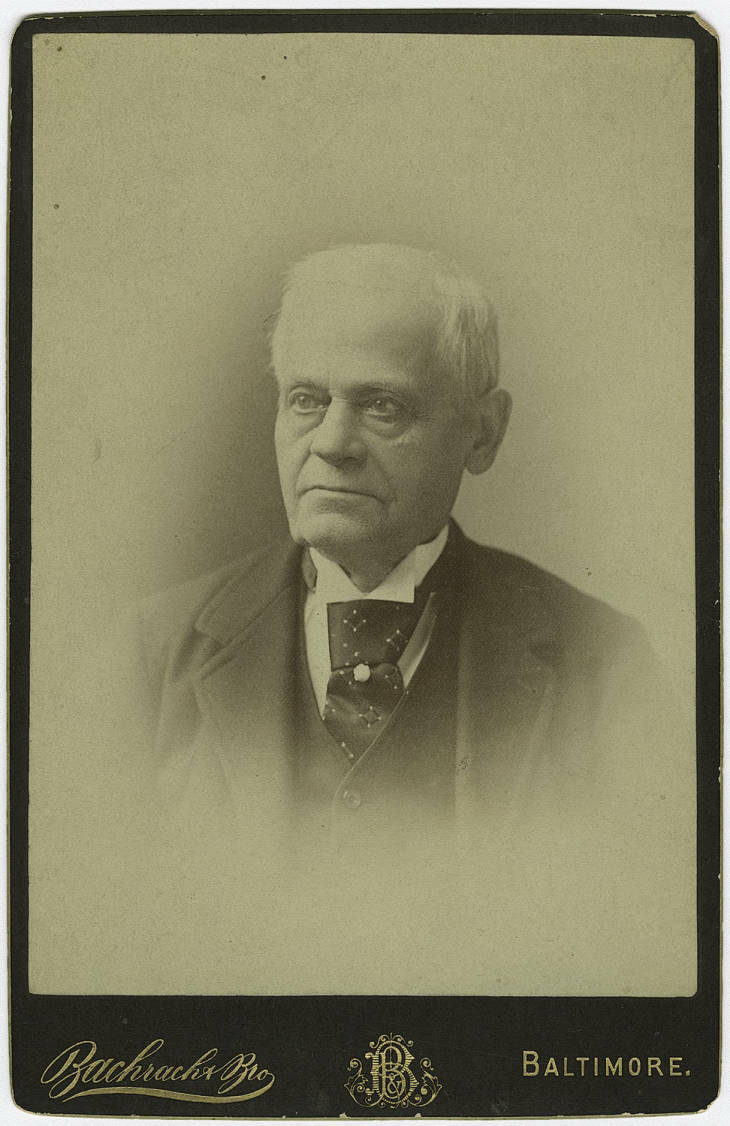
On January 21, Baltimore businessman Enoch Pratt offered a gift to the Mayor and City Council of Baltimore of a Central library, four branch libraries, and an endowment of $1,058,333.00.
"My library," Mr. Pratt is attributed to have said, "shall be for all, rich and poor without distinction of race or color, who, when properly accredited, can take out the books if they will handle them carefully and return them." Later that year, the City of Baltimore accepted Pratt's gift. Baltimore citizens voted their approval on October 25, 1882.
The Board of Trustees would organize in 1883 with Enoch Pratt as President.

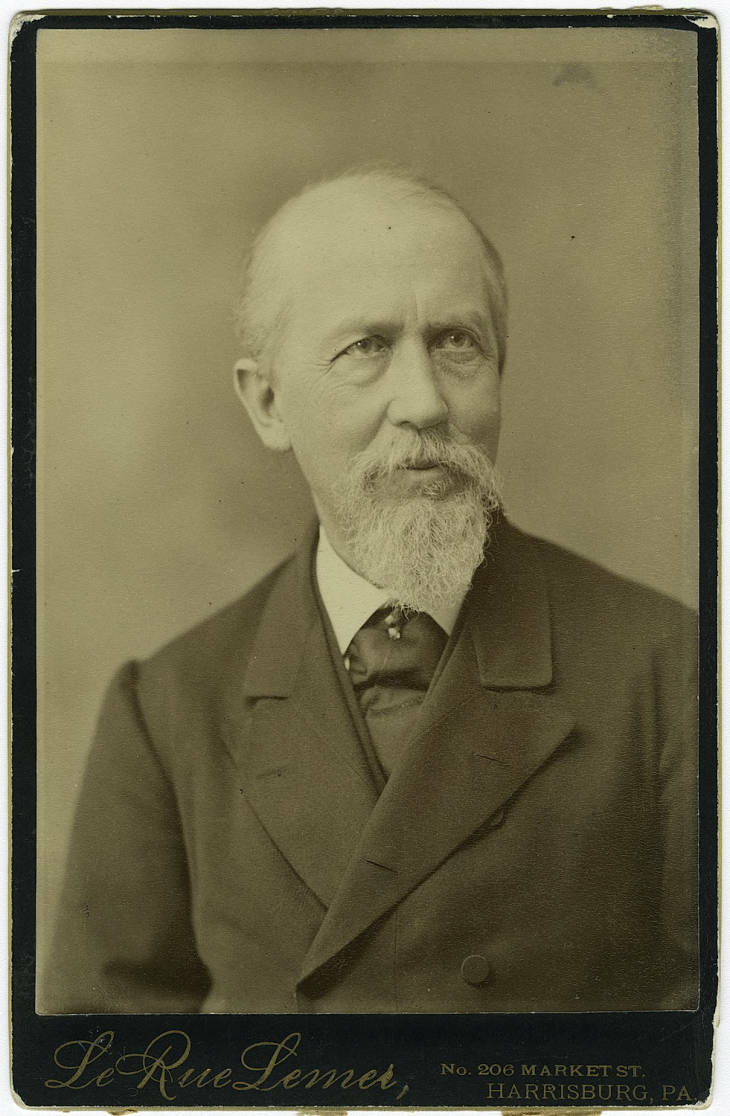
November: The Board of Trustees chose Lewis H. Steiner to be the first Librarian (i.e., Director) of the Pratt Library.

February 25: The Pratt Library purchased its first books, and Assistant Librarian Charles Evans began to catalog them.

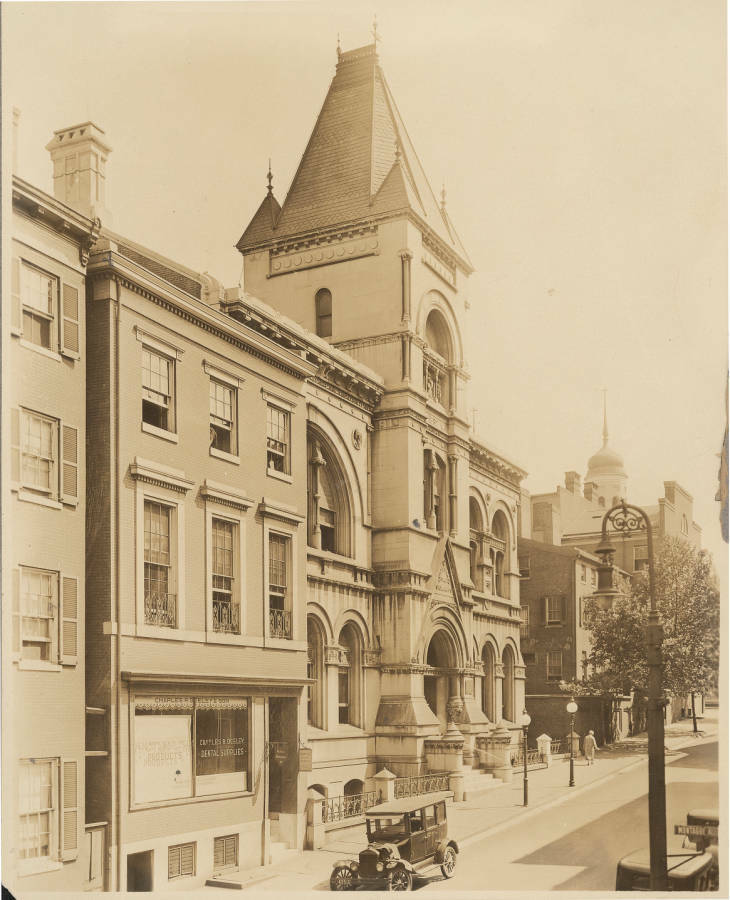
January 5: The Central Library branch opened on Mulberry Street. Within the next three months the Pratt Library would open four additional branches throughout the city of Baltimore.
October 15: The Pratt Library issued a library card to Harry S. Cummings, the first African American to get a Pratt Library card.

Bernard C. Steiner was appointed Director, replacing his father, the late Lewis H. Steiner.
20th Century

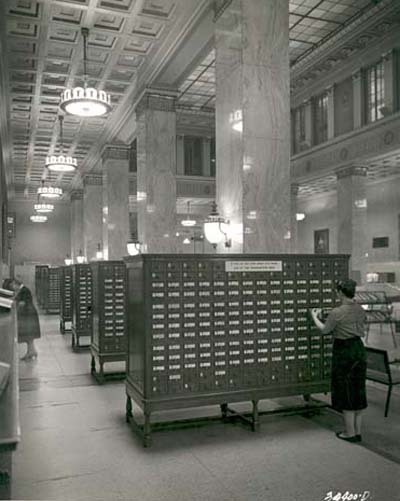
The Central Library created a public card catalog. Replacing the printed Finding List, the card catalog was placed in the registration room at Central Library.

The Pratt Library secured a donation of $500,000 from Andrew Carnegie to build 20 new library branches.

Central Library established a "Consultation Desk," which would later become the Information Services Department.

Joseph L. Wheeler was appointed as Director of the Pratt Library, replacing the late Bernard C. Steiner. Wheeler led a transformation in many of the Pratt Library's services and operations, including placing reference books and popular titles on open book shelves.

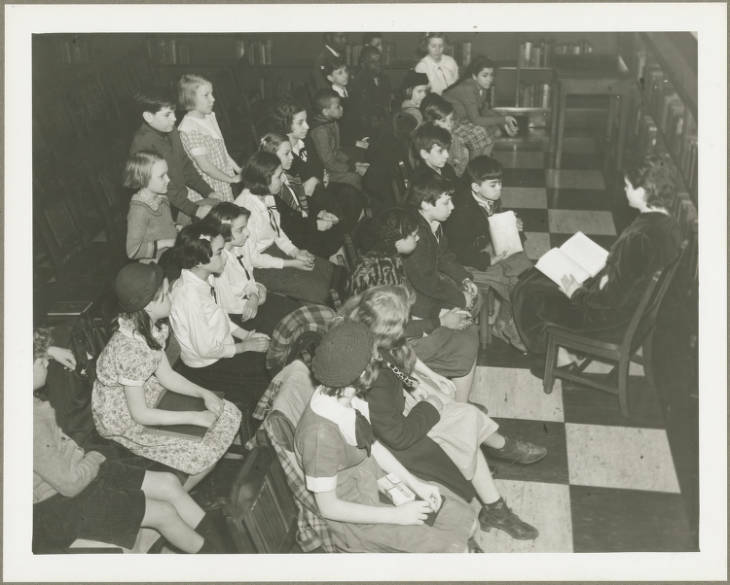
May 3: Baltimore voters approved (by a margin of almost 3 to 1!) a $3 million loan to build a new Central Library building.
Children's Services (now the Children’s Department) began at the Pratt Library, when Director Joseph Wheeler appointed Mary S. Wilkinson as Director of Work with Children.

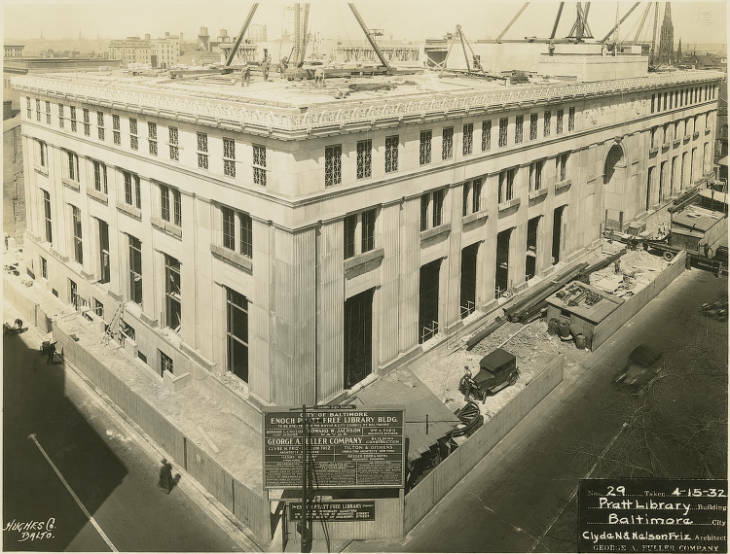
In June 1931, The Pratt Library staff, services, and 400,000 volumes vacated the old Central Library and moved to temporary quarters at Redwood Street and Hopkins Place while construction on the new Central Library on Cathedral Street began.
Notably, the Central Library building had an open floor plan and no steps leading to the door, allowing for easy access to the Library.
The Pratt Library formed specialized subject departments before occupying the new building:
- Education, Philosophy, and Religion
- Civics and Sociology
- Business and Economics
- Industry and Science (formerly called Technology)
- General Reference (later called General Information Department)
- History, Travel, and Biography
- Literature
- Popular Library (later called Fiction)

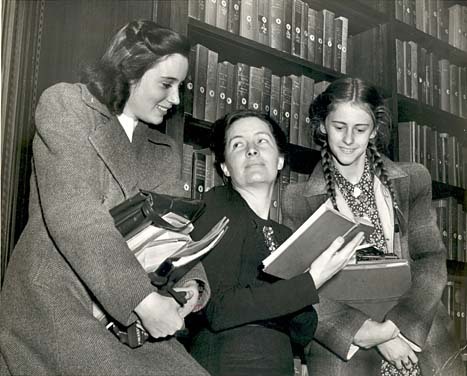
The Pratt Library began providing services specifically for young adults, hiring Margaret Alexander (later Margaret A. Edwards).

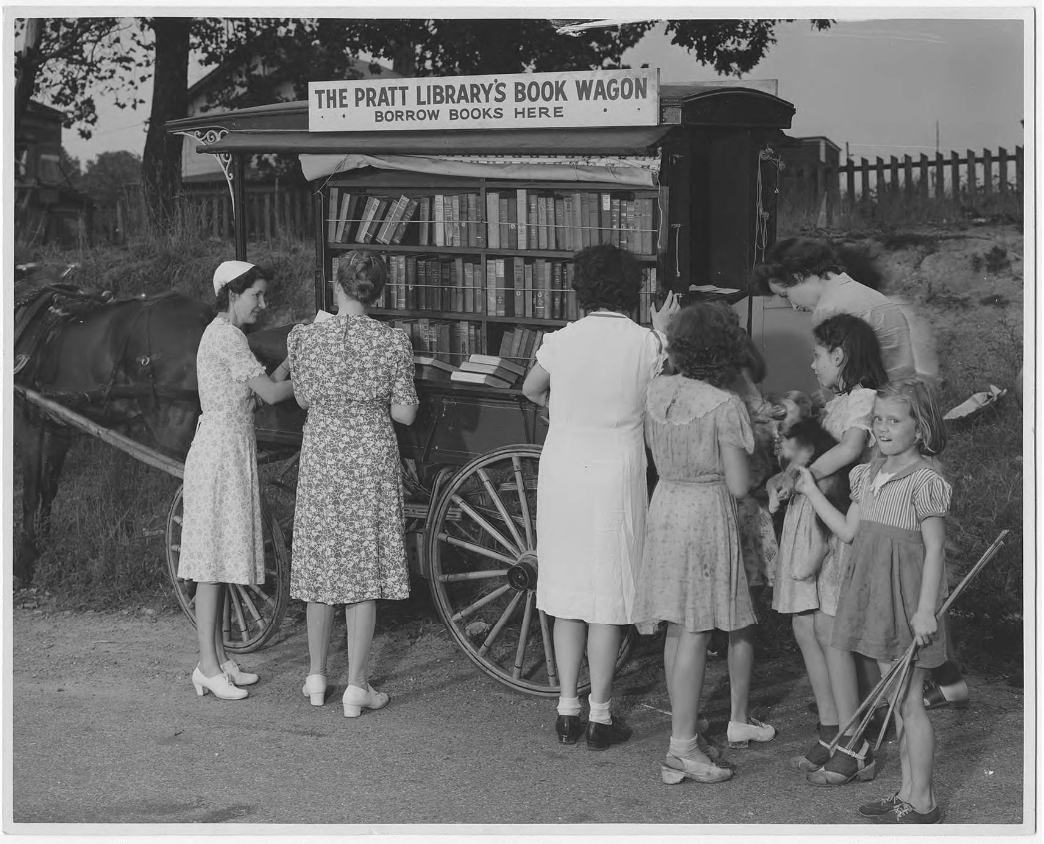
The Library began a horse-drawn book wagon service.

During World War II, the Pratt Library's goal was to "make books more useful to win the war." The Brooklyn Branch became an information bureau for Civil Defense, a headquarters for Red Cross and air raid warden meetings, and it operated a day-care center for working mothers. The Central Library's sub-basement was designated as an air-raid shelter.

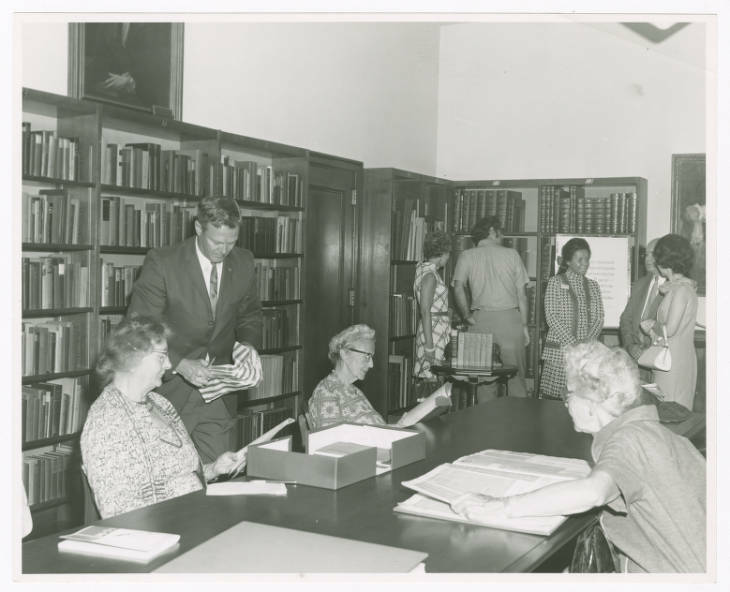
Baltimore author H. L. Mencken deposited his scrapbooks and papers at the Pratt Library. The H.L. Mencken Collection opens to the public once every year, on the Saturday closest to Mencken's birthday (September 12).

April 6: Emerson Greenaway succeeded Joseph L. Wheeler as the Pratt Library's Director.

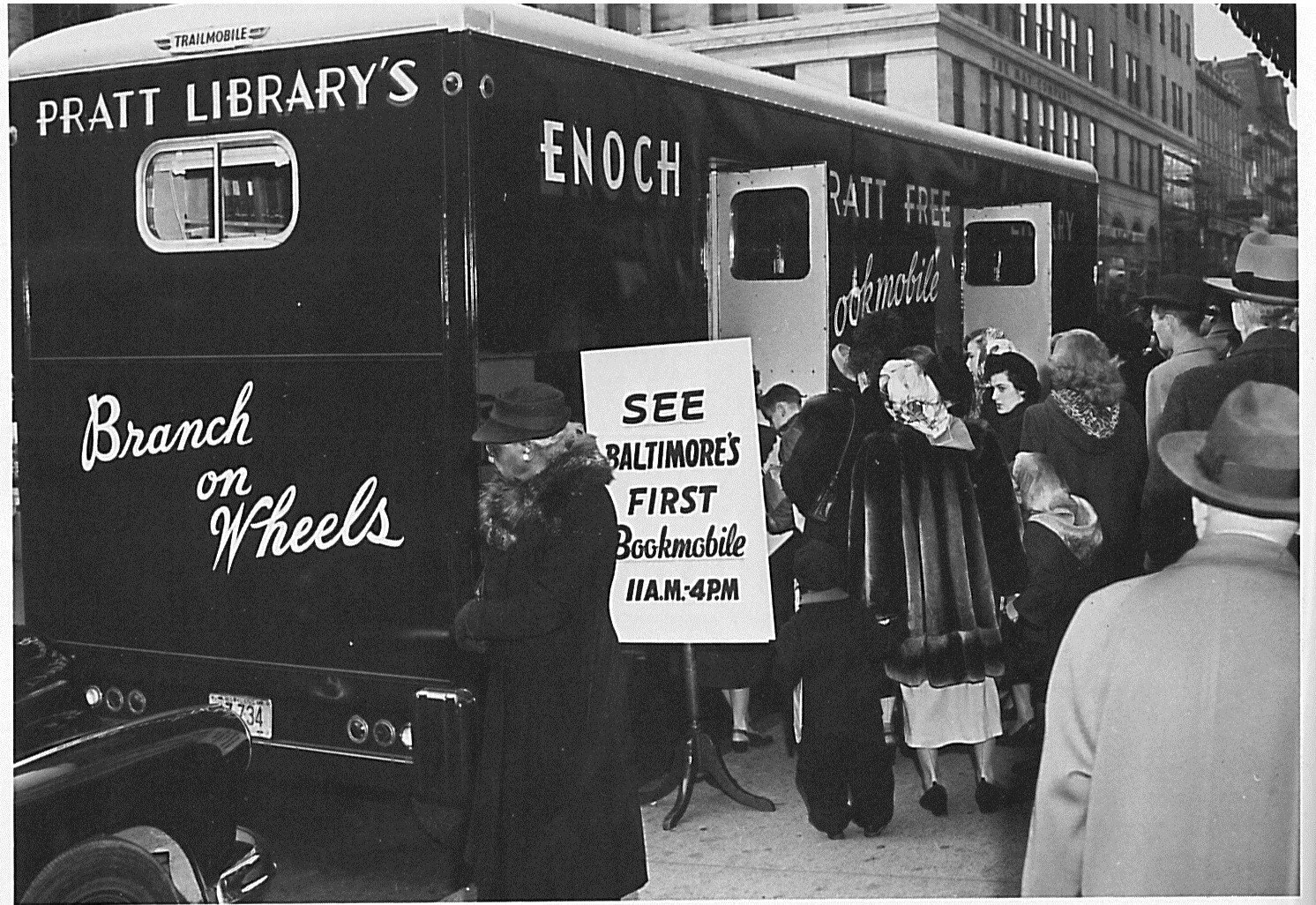
The Pratt Library's first bookmobile began to make rounds, bringing a collection of 9,000 books to neighborhoods of Baltimore. An immediate success, it circulated more than 132,000 books in its first year. The Bookmobile still serves Baltimore residents today.

Amy Winslow replaced Emerson Greenaway as Director of the Pratt Library, becoming the first woman to take on the position.

Arthur H. Parsons became Director of the Pratt Library, following Amy Winslow's retirement.

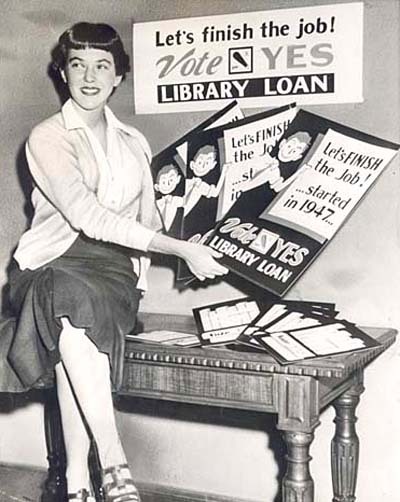
Baltimore voters approved a series of bond issues that allowed the Pratt Library to examine, redistribute, and improve its branch services, including opening several new branches.

July 1: Edwin Castagna became the new Director of the Pratt Library, replacing the late Arthur H. Parsons.

February 11: President Lyndon Johnson signed the Library Service and Construction Act into law, which, along with other Great Society programs, provided funding for many of the Pratt Library's initiatives in the late 20th century.

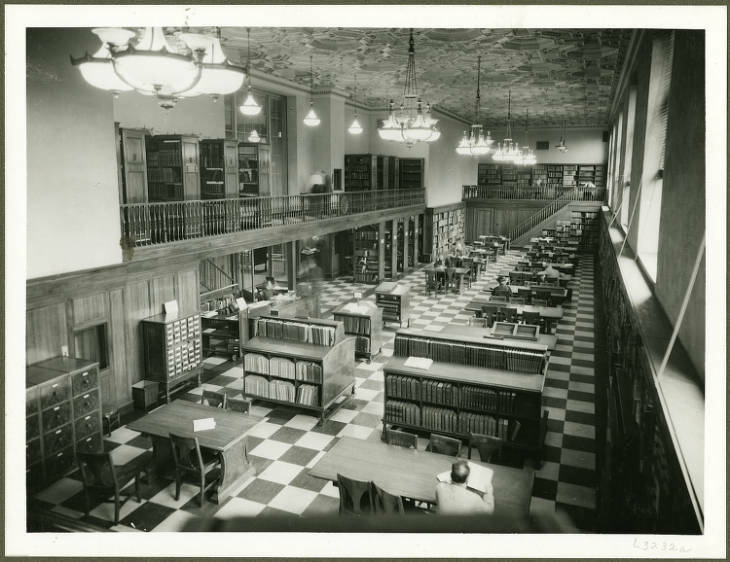
The Central Library reorganized 6 of its subject departments.
- The Business and Economics Department and the Industry and Science Department merged to form the current Business, Science, and Technology Department.
- The Education, Religion, and Philosophy Department, the Civics and Sociology Department, and the History, Travel, and Biography Department combined to form the current Social Science and History Department and the Humanities Department (later to combine with Popular Fiction and Literature to become the Fiction & Humanities Department).

October 2: Telephone Reference opened, and is still in service today.

The Pratt Library's Board of Trustees appointed Kenneth O. Wilson to the Board. Wilson, the first African American appointed to the Board, was Vice-President in charge of advertising for The Baltimore Afro-American.

The Maryland General Assembly designated the Pratt Central Library as the State Library Resource Center (SLRC) for Maryland.

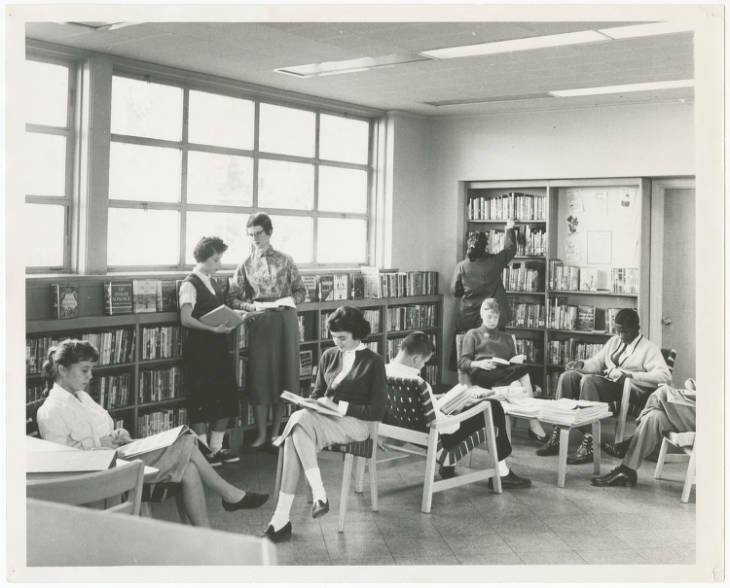
July 14: Ernest Siegel became the new Director of the Pratt Library, replacing Edwin Castagna, who retired after nearly 15 years as Director.
The Pratt Library got its first online database subscription, the New York Times Information Bank. The Pratt Library was the first library in the country to subscribe.

Assistant Director Anna Curry became the first African-American Director of the Pratt Library.

The Pratt Library ordered its first microcomputer hardware. The computer's name, "EPIC" ("Enoch Pratt Information Counselor"), came as a result of a staff "Name the Computer" contest.

Dr. Carla Hayden, formerly First Deputy Commissioner and Chief Librarian of the Chicago Public Library, became the Pratt Library's tenth Director.

June: Maryland was the first state in the U.S. to offer statewide Internet service to its residents with the introduction of SAILOR, Maryland's Online Public Information Network. The SAILOR Operations Center is housed in the Pratt Central Library/SLRC.
July: the Pratt Library was the first public library in Maryland to offer Internet access to customers.
The Pratt Library's first Web page went live.

The Pratt Library's Director Dr. Carla Hayden was named Library Journal's Librarian of the Year.

The Pratt Library won a $240,000 Urban Library Leadership Grant from the Bill and Melinda Gates Foundation. The grant enabled the Library to establish a Center for Technology Training at its Broadway Branch. Today, the Center's free classes teach Baltimoreans how to use the Internet, Microsoft Word, and Microsoft Excel.
Summer: Compass, the Pratt Library's bimonthly newsletter of events, published its first edition.
21st Century

Eddie and Sylvia Brown donated $1 million to the Library for the Eddie and Sylvia Brown African American Collection.
The Pratt Library’s Web site displayed its first digital exhibit - The Cator Collection of Baltimore Views.
November 14: The Library launched a Book Buggy. This bookmobile service travelled to Head Start centers with books, computers and educational materials to promote reading readiness among preschoolers.

April 17: The Pratt Library held groundbreaking ceremonies for the Central Library/SLRC's new annex expansion.
May: The Pratt Library's Director Dr. Carla Hayden was elected President of the American Library Association for 2003-2004.

The Pratt Library received the Exemplary Digital Reference Services Award at the Virtual Reference Desk Conference in San Antonio, Texas.
November 3: Grand opening ceremonies were held for the new annex to the Central Library/SLRC, home to the African American Department, Maryland Department, H. L. Mencken Room, and Special Collections.

March: The Pratt Library received an anonymous donation of $1 million restricted for use in its 21 branch libraries.
March: The Pratt Library received a gift of $250,000 from the Middendorf Foundation to help maintain the excellence of the Library’s Maryland Department.

September: The Pratt Library unveiled its First Card, a new library card for children ages 6 and under.

February 26: The Pratt Library’s redesigned website became available at www.prattlibrary.org.

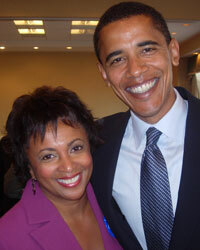
February: President Barack Obama nominates Dr. Carla Hayden as the next Librarian of Congress.
June: A groundbreaking ceremony is held for the historic $115 million renovation of the Central Library.
July: Dr. Carla Hayden is confirmed as the 14th Librarian of Congress. Dr. Hayden is the first woman and the first African American to serve in the role.

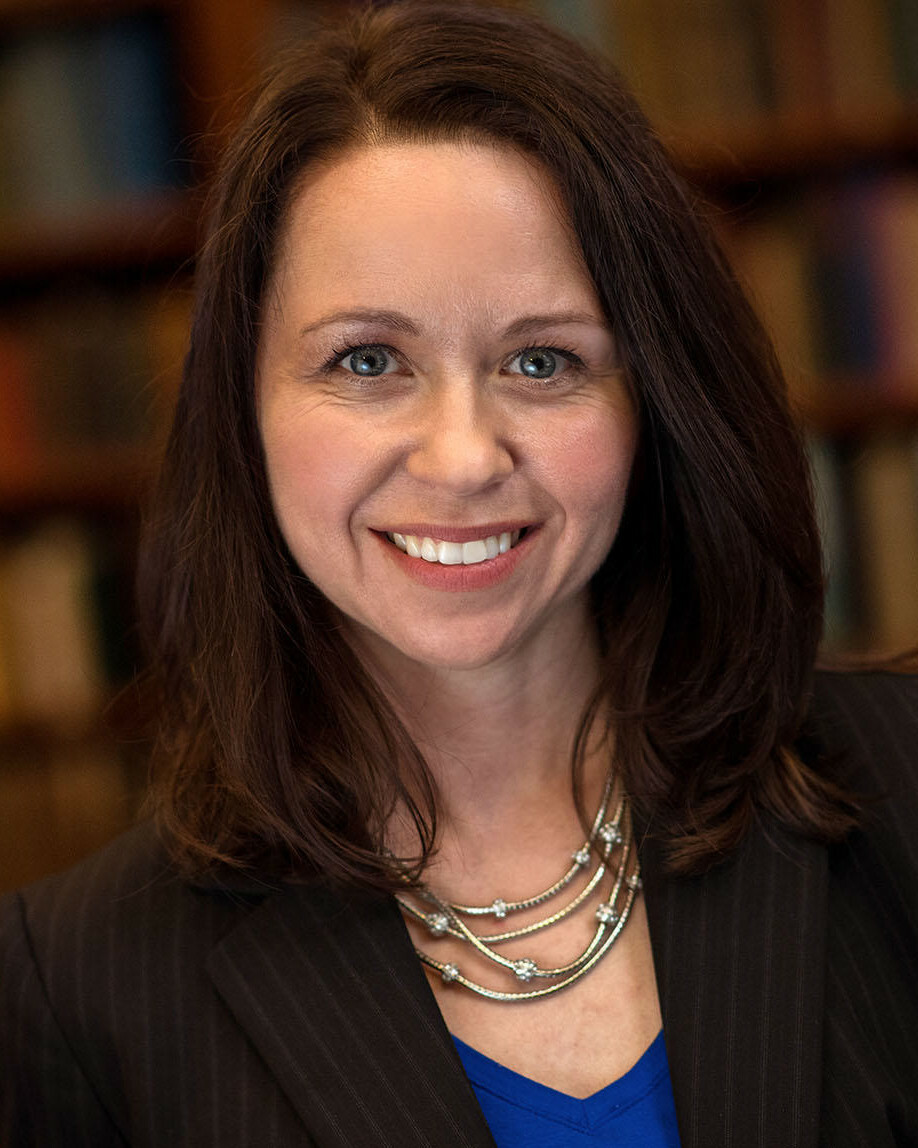
April: Heidi Daniel, formerly Executive Director of the Public Library of Youngstown and Mahoning County in Ohio, is named the eleventh President & CEO of the Enoch Pratt Free Library.

January 8: The Pratt increased service hours by 30%, and neighborhood branches moved to a universal schedule.
“It means increased access to early-learning and childcare-giver programs, increased chances to connect with a social worker and a lawyer, increased access to job assistance and computer classes, to a place to do work, to learn, to see the possibilities that exist, and to create your future.” –President & CEO Heidi Daniel
June 11: The Pratt becomes fine free, the first major urban public library system on the East Coast to eliminate fines on overdue books and other materials. The Library wiped out $186,000 in penalties for 26,000 people and welcomed back 13,000 borrowers whose cards have been blocked.
October 12: The Enoch Pratt Free Library is named One of the Nicest Places in America by Good Morning America and Reader’s Digest.


August 12: Enoch Pratt eCards are launched, allowing users to check out eBooks, use databases for research, watch streaming media, and more from the comfort of home.
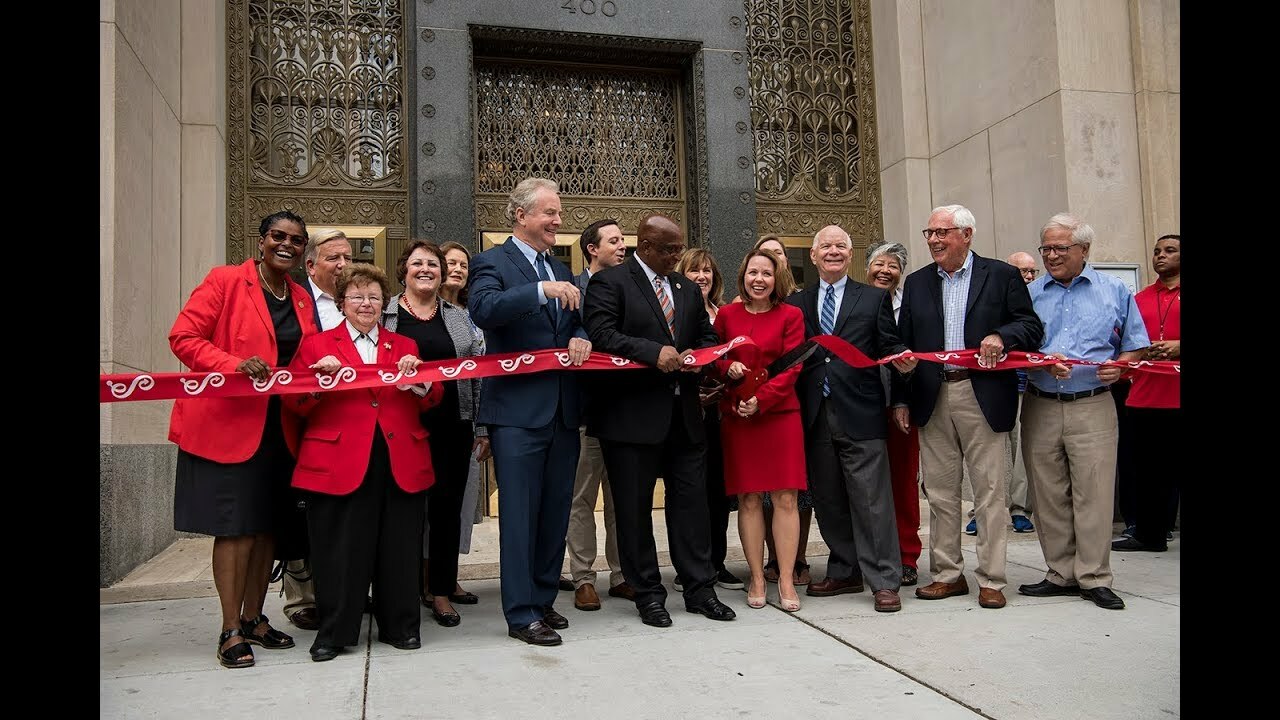
September 14: Pratt Central Library Reopens after an historic $115 million renovation. The renovation expanded the Teen Center with a state-of-the-art audio and video recording studio and restored the iconic Central Hall, as well as the Children’s Department and Wheeler Auditorium.


January 13: The Pratt becomes the first Baltimore City agency to hire a Diversity, Equity & Inclusion Officer and form a Diversity, Equity & Inclusion Council, committing the Pratt to DEI perspectives in all Library services and programs.
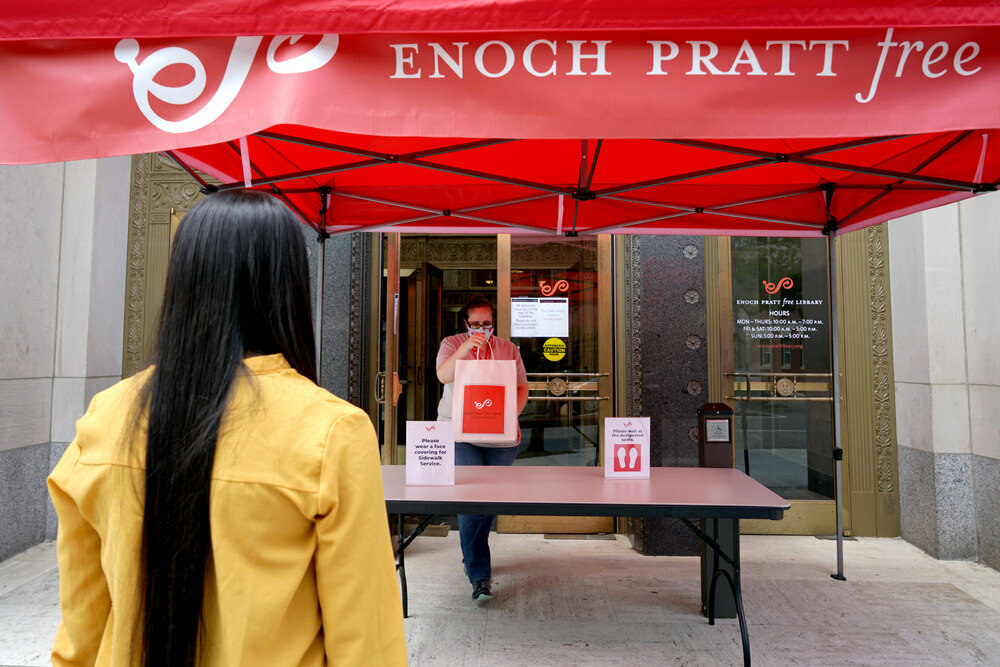
June: Sidewalk Service, a contactless pickup service, is launched at all Pratt Library locations during COVID-19 closures. Drive-In Wi-Fi is also launched at Pratt locations across the city of Baltimore, providing free internet access to the community.

August 24: Prattlibrary.org is fully redesigned, increasing the Library's capacity to serve the citizens of Baltimore, Maryland, and beyond through optimized user experience and mobile-friendly functionality.

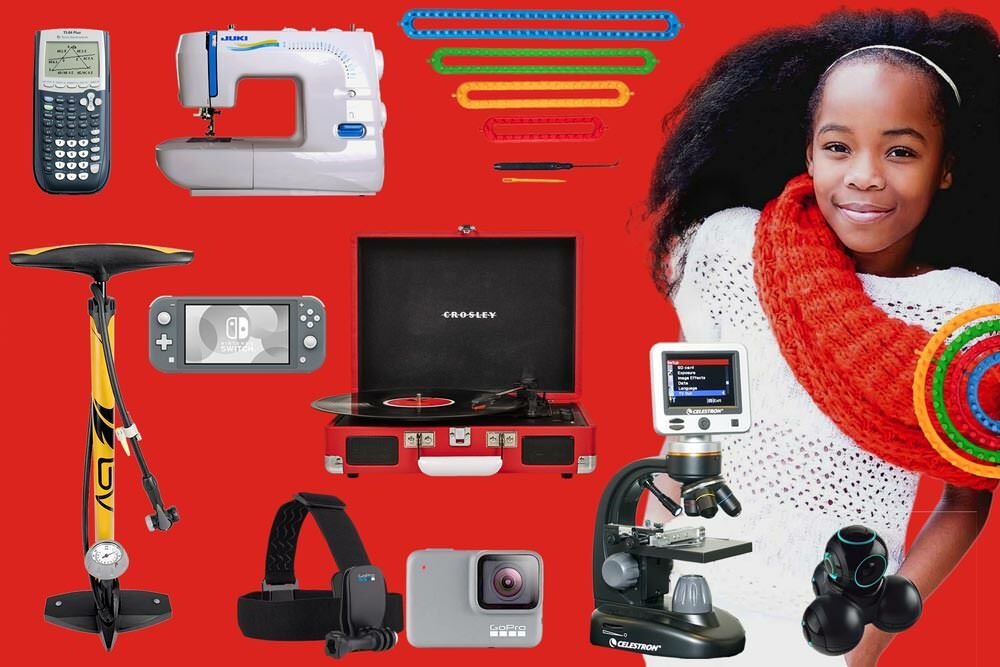
February 1: The Pratt Library of Things is launched, allowing teens to check out STEAM kits, sewing machines, musical instruments, and more.

March 8: Enoch Pratt Free Library locations reopen to the public for browsing and computer use with health and safety procedures in place.
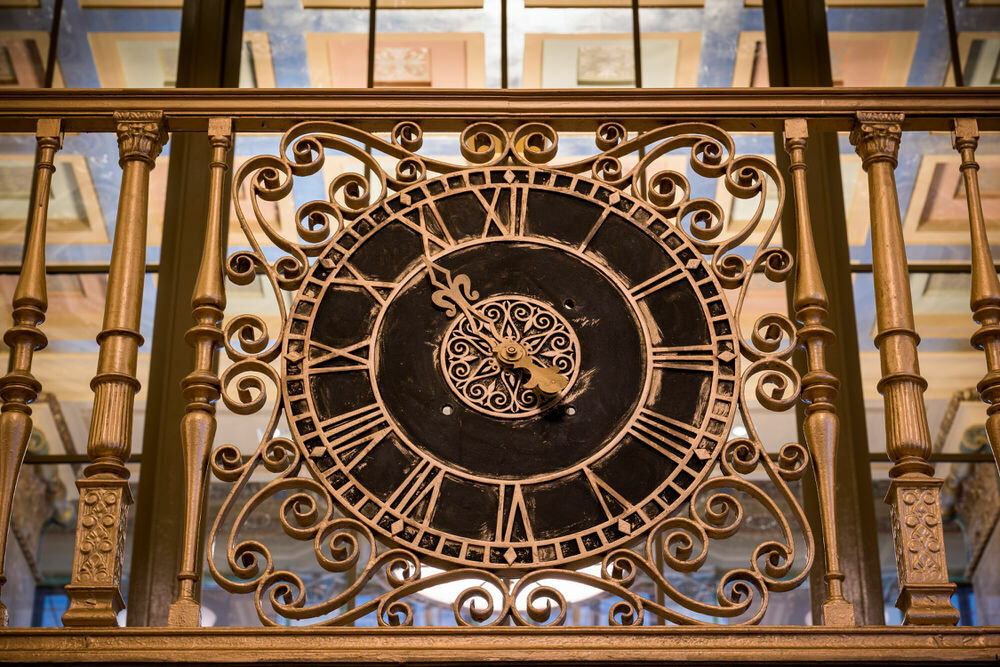
May: Pratt’s Operating Hours & Funding Legislation, SB477/ HB436, is passed. The $3 million annual funding allows the Pratt to maintain expanded hours, keeping libraries open six days a week.
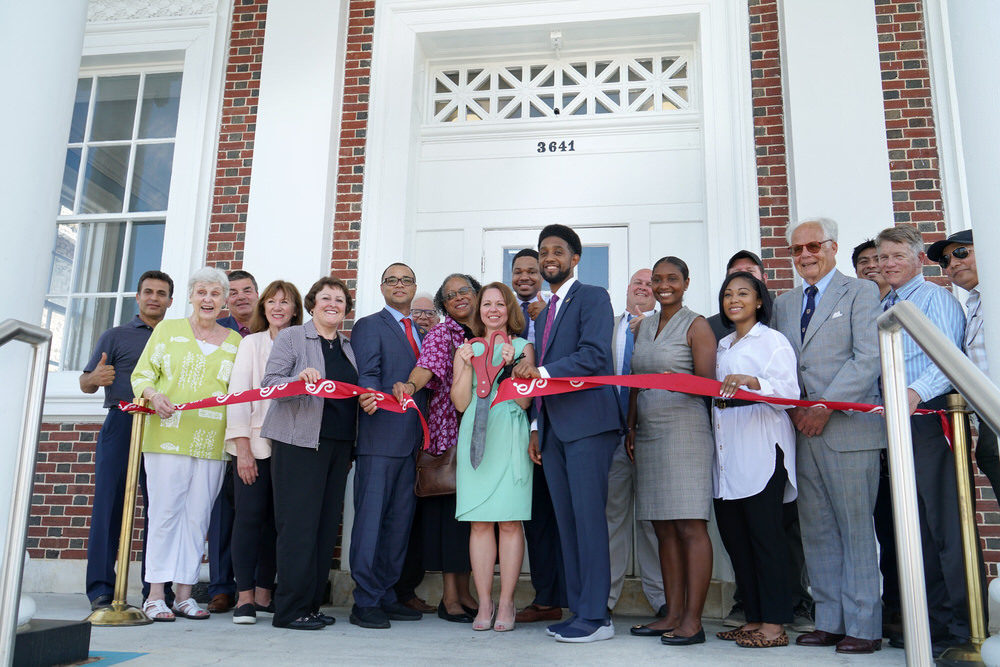
June 21: The Hampden Branch reopens following a two-year renovation. The 121-year-old library features a new meeting room and office space and a ramp in the front, among other improvements.

June: The Pratt introduces Summer Break Baltimore, an all-ages summer reading program that re-engaged customers following the pandemic and helped build home libraries. Summer Break Baltimore served 15,553 participants in its first year and continues to grow.


February 21: Mayor Brandon M. Scott awarded $11.7 million in American Rescue Plan Act (ARPA) funding to the Library to advance digital equity, update HVAC systems at prioritized City libraries, and help build a new library in the Park Heights community.

March 15: With support from partner organizations, the Pratt Library expands social impact programs including Wellness at the Pratt, Peer Navigators, and Housing Navigators.

October: In partnership with Baltimore City Information & Technology and the Maryland Office of Statewide Broadband, the Pratt Library begins distributing 50,000 HP Chromebooks to eligible Baltimore City households, working to increase digital equity in our community.


July: The Pratt Center for Technology Training introduces the Digital Navigator Program. Digital Navigators serve as Pratt and technology ambassadors and provide basic digital literacy classes in select branches, funded by the American Rescue Plan.

September: Chad Helton, formerly Director of Hennepin County Library in Minnesota, is named the twelfth President & CEO of the Enoch Pratt Free Library.





